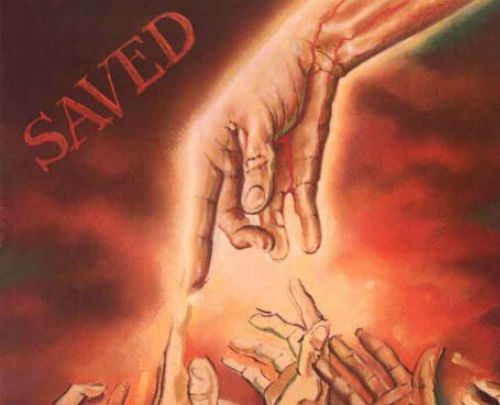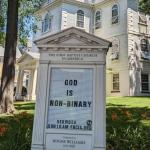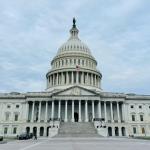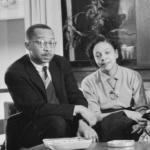Originally posted June 20, 2008.
Read this entire series, for free, via the convenient Left Behind Index. This post is also part of the ebook collection The Anti-Christ Handbook: Volume 1, available on Amazon for just $2.99. Thank you for your support. Volume 2 of The Anti-Christ Handbook, completing all the posts on the first Left Behind book, is also now available.
Left Behind, pp. 449-451
And so the final chapter, the big showdown begins. Nicolae Carpathia steps forward to cement his control with an undeniable “show of strength.” Soon the whole world will bear witness to his fearsome power.
Except that Nicolae is, at the moment, in “a private conference room” with no TV cameras. That’s not really an ideal location for staging a show of strength for the whole world to see, but he has arranged to have the press there to report on the feats he’s about to perform.
Well, not so much the press as one reporter, actually.
Well, one former reporter who never actually publishes anything.
Oh, and Nicolae plans to brainwash that reporter and everyone else in the room to make sure that no one ever hears about what he’s about to do there.
I’m starting to think that maybe Nicolae hasn’t really thought this through. If a show of strength falls in the forest and no one’s there to hear it, will anyone be impressed?
Nicolae’s actions in this chapter provide a bit of the creepiness that’s been sorely lacking for most of this book, but it would have been much creepier, much more unsettling and affecting, if those actions had also made sense. He conducts his grand public demonstration in private and then ensures that even the few witnesses he’s assembled won’t be able to remember what they just saw. This grand display of his eeeevil powers, which he performs in full-on “So you see Meester Bond …” mode, also doesn’t turn out to be all that evil, really. I mean, yeah, it’s wrong — his actions are clearly both a crime and a sin — but his victims also had it coming. The authors seem to be shooting for a grand violent gesture in which Nicolae displays his cold-blooded ruthlessness in pursuit of power — something like Keyser Soze on the docks or the baptism scene from The Godfather. But here at the end of a book with a body count already in the millions, the deaths of two more people just doesn’t seem all that chilling.
The fact that this scene was written by Jerry Jenkins also doesn’t help:
Nicolae Carpathia stepped out from his place at the table and went to each person individually. He greeted each by name, asking him to stand, shaking his hand, and kissing him on both cheeks. He skipped Hattie and started with the new British ambassador.
“Mr. Todd-Cothran,” he said …
This is a signature tick throughout the book. First Jenkins summarizes what’s about to happen, then he goes back to the beginning and goes through it again step-by-step. But he does this all in the past-tense, making it hard to figure out the actual sequence of events. (Is T-C the first person he addresses, or has he worked his way around the table and then “started” to repeat the established pattern with T-C?) You get the feeling that Jenkins always starts a joke with the punchline.
Why not just start like this instead?
Nicolae rose and approached Todd-Cothran, asking him to stand. He shook the financier’s hand and kissed him on both cheeks. “Mr. Todd-Cothran …”
Anyway, Carpathia tells T-C:
“You shall be introduced as the ambassador of the Great States of Britain, which now include much of Western and Eastern Europe. I welcome you to the team and confer upon you all the rights and privileges that go with your new station. May you display to me and to those in your charge the consistency and wisdom that have brought you to this position.”
This again demonstrates that LaHaye & Jenkins don’t really understand what “ambassador” means. They seem to think that ambassadors to the United Nations are appointed by the United Nations — that they are chosen by the secretary-general to act as his lieutenants, like colonial governors or prefects of the One World Government.
This arrangement isn’t something being newly instituted by Carpathia as part of his future OWG — this is how the authors imagine the U.N. works now, today. They believe that Ban Ki-moon [António Guterres] is, right now, the supreme leader of the whole world, dictating policy for all the member nations of the U.N. Again, this seems an impossible thing to believe — requiring an astonishing level of ignorance about an institution that they claim is of supreme importance. They are able to maintain such ignorance, in part, because this delusion also allows them to flatter themselves. They enjoy telling themselves that America, and only America, has managed to maintain its national sovereignty, refusing to bend its knee to Ban or to allow his hand-picked delegate, Zalmay Khalilzad, to dictate our national policy.
This is breathtaking stupidity in the service of self-congratulation. Then again, that’s kind of the theme of the entire book. What else would you expect from a pair of authors whose Mary Sue stand-ins are Rayford Steele and Buck Williams?
The only difference, the authors believe, between Nicolae’s U.N. and the real one that exists today is that Carpathia has merged the subordinate nations of the world into only 10 federations. They chose the number 10 because of Revelation 13:1:
And the dragon stood on the shore of the sea. And I saw a beast coming out of the sea. He had 10 horns and seven heads, with 10 crowns on his horns, and on each head a blasphemous name.
L&J don’t really have any idea what that means either, but it’s got the number 10 in it, so they’ve decided the “10 horns … with 10 crowns” must refer to 10 divisions of the One World Government instituted by the secretary-general of the United Nations.
This is what L&J mean by a “literal interpretation of the Bible.”
“Thank you, sir,” Todd-Cothran said, and sat down as Carpathia moved on. Todd-Cothran appeared shocked, as did several others, when Nicolae repeated the same sentiment, including precisely the same title — ambassador of the Great States of Britain — to the British financier next to him. Todd-Cothran smiled tolerantly. Obviously, Carpathia had merely misspoken and should have referred to the man as one of his financial advisers. Yet Buck had never seen Carpathia make such a slip.
Apart from the clumsy writing, that’s actually a half-decent bit of foreshadowing. What squelches that for me is Buck’s utter lack of interest in Todd-Cothran, a man he’s seeing here for the very first time. This guy planted a bomb in Buck’s car. This is the man who forced Buck to flee for his life, lamming to Germany under an assumed name. That was seven days ago. A week later Buck isn’t the least bit curious about the guy or the least bit uncomfortable to be sitting across the room from him. I realize that he claims not to want Buck dead at the moment, but he’s still someone you’d think our hero would want to keep an eye on.
All around the four-sided table configuration Carpathia went, one by one, saying exactly the same words to every ambassador, but customizing the litany to include the appropriate name and title. The recitation changed only slightly for his personal aides and advisers.
This reminds me of something:
“Enthusiams. What are mine? What draws my admiration? What is that which gives me joy? Baseball!”
Those are lines from The Untouchables, spoken by a baseball-bat wielding Robert Deniro as the mobster Al Capone, circling a similar group of dignitaries arranged around a similar table. The air of palpable menace in that scene seems to be what L&J are trying for, but they never quite get there. Not even after Chekhov’s gun makes its belated appearance a few pages from now.
What we get here, instead, are repeated recitations of:
“I welcome you to the team and confer upon you all the rights and privileges that go with your new station. May you display to me and to those in your charge the consistency and wisdom that have brought you to this position.”
We’ve been told that Carpathia is eloquent and that he speaks, always, in “perfect English,” but that’s hard to reconcile with the character we actually see — the man who thinks this ugly, awkward paragraph conveys a sense of ceremonial solemnity. “Consistency” is an odd word-choice there, conveying some middle range of praise, somewhere between “punctuality” and “dedication.” And “team” is just jarringly wrong. Evil Transylvanian megalomaniacs setting out to rule the world just do not say, “welcome to the team.” The Antichrist shouldn’t talk like David Brent. (Although if he did, consistently, this would’ve been a much more entertaining, and much more frightening, book.)
When Carpathia got to Buck he seemed to hesitate. Buck was slow on the draw, as if he wasn’t sure he was to be included in this. Carpathia’s warm smile welcomed him to stand. Buck was slightly off balance, trying to hold pen and notebook while shaking hands with the dramatic Carpathia. Nicolae’s grip was firm and strong, and he maintained it throughout his recitation. He looked directly into Buck’s eyes and spoke with quiet authority.“Mr. Williams,” he said, “I welcome you to the team and confer upon you all the rights and privileges that go with your station. …”
Since we’ve noted that Carpathia’s actions in this chapter don’t make any sense, we should probably also note that Buck’s actions, even his very presence here, are equally absurd. Ever since Bruce Barnes warned him not to go to this meeting, Buck has insisted that he had to go — that it was his duty as a reporter and an opportunity he couldn’t turn down. And he was right about that — an all-time scoop is unfolding before his eyes. Here, for the first time anywhere, the newly appointed World Leader is laying out the political and geographical divisions of the New World Order. And here, for the first time anywhere, he is identifying the Council of Global Governors, the men who will each rule one tenth of the world. Sure, this will all be reviewed again at the press conference an hour from now, but Buck is getting more of the story and he’s getting it first.
Yet Buck isn’t taking notes as these men are introduced and their various principalities are outlined. Buck isn’t even paying attention. He couldn’t pick the Ambassador for the Great States of South America out of a police lineup. He was willing to risk his life to be the lone journalist granted access to this room, but once there he fails to perform any journalistic function, focusing instead only on those details that are of interest to him personally — details he has no intention of reporting to his readers, should he ever actually write anything.
That’s not surprising, since this what Buck has done throughout the book. He has used his role as a “journalist” to book flights to London and Chicago, to gain access to meetings at the U.N. and to private interviews at the Plaza, yet he’s never taken any notes, or filed any reports from any of those places. He’s run up an enormous tab on Global Weekly’s expense account, yet the magazine has nothing to show for it. (What’s more, the magazine doesn’t seem to care. Nobody says, “Say, Buck, didn’t we just pay to send you to London? Shouldn’t we be getting a story out of that?” Instead, he gets promoted.)
It’s not that Buck seems to be a bad journalist, but rather that he doesn’t seem to be a journalist at all.
Yet now, here, in the presence of “the truest, deepest, darkest spirit of evil,” face to face with the Antichrist himself, Buck’s soul is kept safe. And what is it that protects him? It’s not divine intervention, not the prayers of Bruce and Chloe on his behalf, and not the indwelling of the Holy Spirit. No, the thing that saves Buck’s soul here, that shields his mind from the mojo-puppetry of the Antichrist, is his indignation that his independence as a journalist is being called into question.

This is Buck Williams’ Scott-McLellan moment:
What was this? It was not what Buck expected, but it was so affirming, so flattering. He was not part of any team, and no rights or privileges should be conferred upon him! He shook his head slightly … but Nicolae nodded slightly and smiled all the more, looking more deeply into Buck’s eyes. …
Buck wanted to stand taller, to thank his mentor, his leader, the bestower of this honor. But no! It wasn’t right! He didn’t work for Carpathia. He was an independent journalist, not a supporter, not a follower, and certainly not an employee. His spirit resisted the temptation to say, “Thank you, sir,” as everyone else had. He sensed and read the evil of the man and it was all he could do to keep from pointing at him and calling him the Antichrist. He could almost hear himself screaming it at Carpathia. …
After an awkward silence, Buck heard chuckles, and Carpathia said, “You are most welcome, my slightly overcome and tongue-tied friend.” The others laughed and applauded as Carpathia kissed him, but Buck did not smile. Neither did he thank the secretary-general. Bile rose in his throat.
It feels strange to write this, but I like that passage.
Buck Williams has been, up until this moment, the shoddiest of craftsmen and ethically bankrupt as a journalist. He has buried stories at the behest of criminals. He has conducted every interview off the record. And he hasn’t filed a story in more than a year. He is, in every way, just about the sorriest excuse for a journalist imaginable. And yet here he grasps something basic about the job that most of our elite Beltway media do not seem to understand.
The scene above could be read aloud every year at the White House Correspondents Dinner for the edification of the journalists assembled there. This is how you should respond when some politician gives you a chummy nickname or invites you to a barbecue or lets you sit next to him on the bus or otherwise threatens to co-opt your independence by making you feel like you’re just part of the team: You should jump back, point at them, and scream “Antichrist!” until they get the picture.
After he sits back down, Buck tells himself that:
Had he not belonged to God he would have been swept into the web of this man of deceit. … Bruce Barnes had pleaded with Buck not to attend this meeting, and now Buck knew why. Had he come in unprepared, had he not been prayed for by Bruce and Chloe and probably Captain Steele, who knows whether he would have made his decision and his commitment to Christ in time to have the power to resist the lure of acceptance and power?
But re-read the passages quoted above. It wasn’t God or those prayers that gave Buck “the power to resist … power.” It was something far more modest — the tiniest remaining sliver of Buck’s journalistic ethics. That lonely, stunted, heretofore-neglected crumb of integrity seems to have saved Buck’s soul.
But then even that is not quite right. What really causes Buck to rise up and resist Nicolae isn’t the idea of violating his journalistic integrity. What allows him to resist here is his indignation that he might be thought of as someone who would do this. In a sense, it’s Buck’s vanity — his delusional, comically inflated self-perception — that gets his ire up here.
Yet it’s simply impossible that such vanity could be sustained here. Not in this time and place, around this very table where the two men sat who had agreed to withdraw their contract on Buck’s life because he had already, explicitly agreed, just one week ago, to betray his journalistic independence and to accept his role as part of the team from the very man who was, at this moment, shaking his hand and looking into his eyes. In that situation, it’s just impossible to think that Buck could tell himself he was “an independent journalist … not an employee,” and believe what he was thinking.
So I like to think here that in that moment of desperate self-assertion Buck may have experienced a nanosecond’s worth of actual self-knowledge. He may have caught a sideways glimpse of the yawning chasm beneath his feet, of the vast gulf between the things he told himself about himself and the way he really was. The glimpse couldn’t have lasted any longer than that briefest instant or he wouldn’t have been able to survive it, but perhaps it lasted just long enough — the twinkling of an eye, as it were — to serve as a window to grace.
In his letter to the Romans, St. Paul writes that “The Spirit helps us in our weakness. We do not know what we ought to pray for, but the Spirit intercedes for us with groans that words cannot express.” That’s a very different concept of prayer than the idea that we can bind God to our will by saying the magic words, but perhaps this was the sort of prayer accredited to Buck in that nanosecond. “Oh my God,” he thought in that instant, “I’m ridiculous!“
And perhaps that was enough.
















